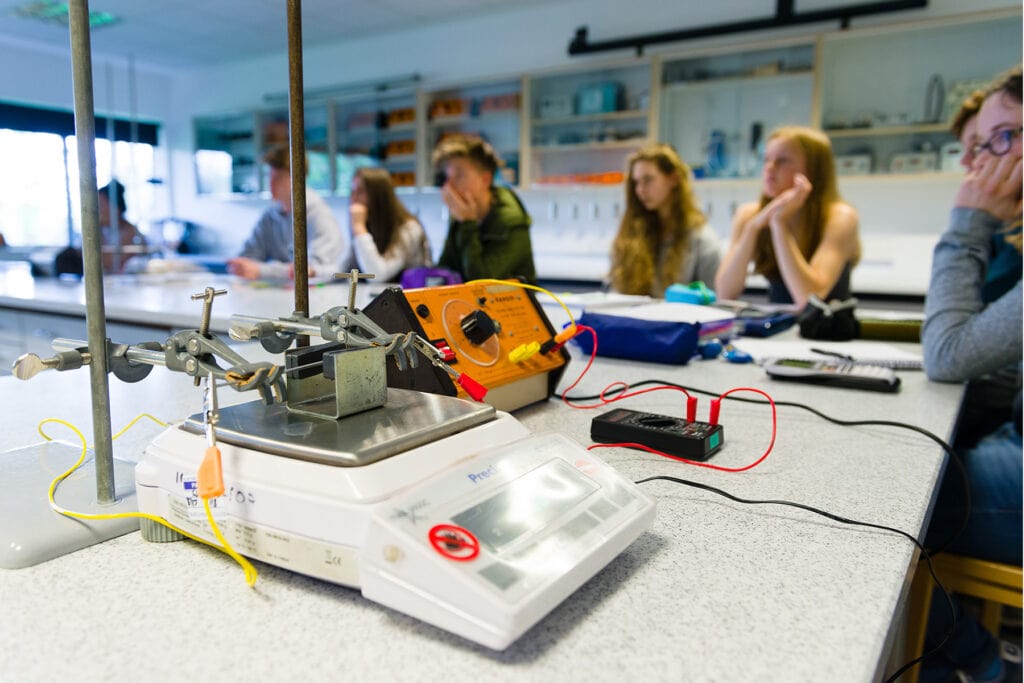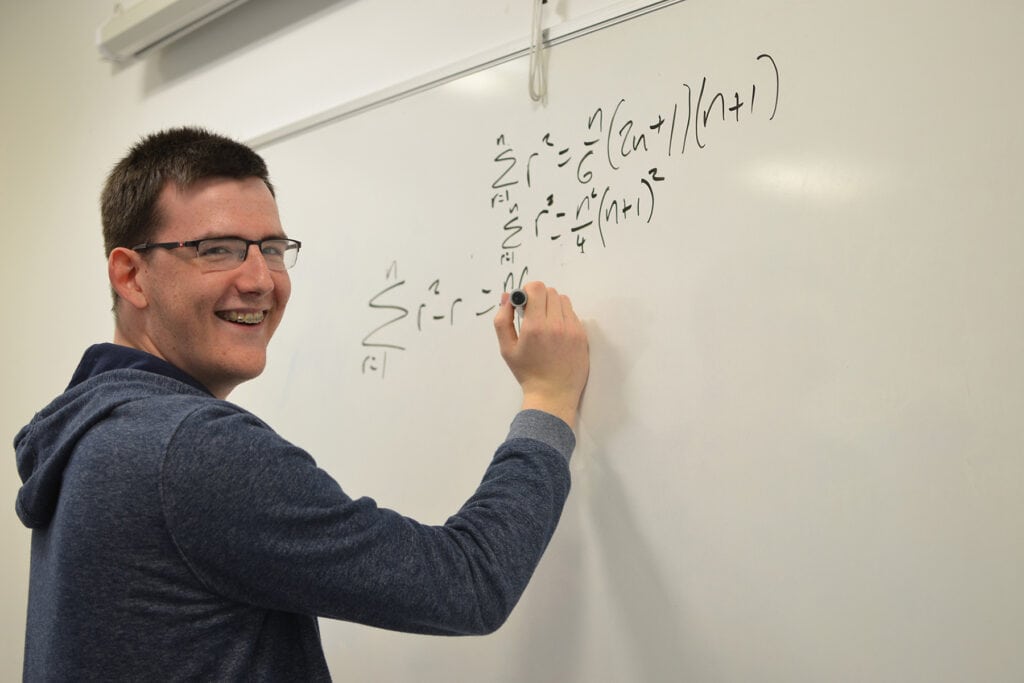New students starting in September: You can find out more about Induction Days and other useful information in our Start of Year Guide.
Why choose this course?
Do you enjoy solving puzzles and playing strategy games? Do you want to develop a deep understanding of big ideas? Do you want to know ‘why’ and not just ‘how’? Do you want a stimulating and challenging course that will develop key skills such as problem-solving, logical reasoning, communication, and resilience? If the answer is yes, this could be the course for you. By studying Further Mathematics, you will increase your knowledge and understanding of mathematical techniques and their applications as well as enhancing your study of other subjects, in particular Physics, Computer Science, Chemistry, Biology, Geography, Psychology and Economics.
Apply for this course
Start date: 08/09/2025
TOP COURSE HIGHLIGHTS
Small class sizes
Personalised support
Great links to STEM careers
Enrichment opportunities
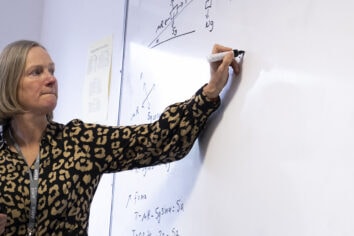
Friendly and supportive specialist staff
The maths team are friendly, supportive, hardworking and committed to helping you succeed. Reaching your potential in this subject relies heavily on your attendance, punctuality and commitment to learning and revision, and acting on advice given by your lecturer.
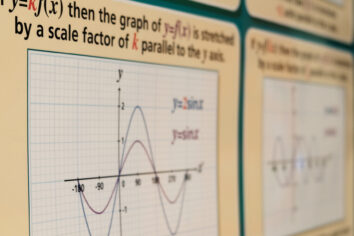
Preparation for University Entry exams
Preparation for university entrance papers and scholarship papers including Advanced Extension Award (AEA), Test of Mathematics for University Admissions (TMUA) and Sixth Term Entrance Papers (STEP).
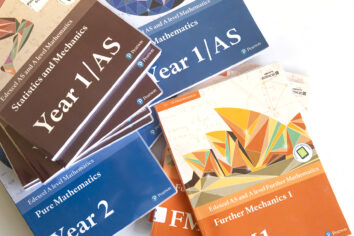
Enrichment activites
Our students have access to a wide range of enrichment activities. We enter students for the UKMT Senior Maths Challenge and the Senior Team Challenge each year, some of whom progress to the Senior Kangaroo or rounds of the British Maths Olympiad.
WHAT WILL I LEARN?
Further Mathematics is designed to stretch and challenge able young mathematicians by introducing you to new techniques and concepts, such as complex numbers and matrices, as well as studying material from A Level Mathematics in greater depth. You will be taught by highly qualified specialist subject tutors in classes consisting exclusively of Further Mathematics students.
In Mathematics, you will extend some of the core ideas from GCSE Mathematics, such as quadratic equations, coordinate geometry, algebra, sequences and trigonometry. You will also meet material that may be new to you, such as calculus, logarithms, trigonometric identities and vector geometry. You will extend the range of functions that you can use and learn about partial fractions, exponential functions, algebraic proof and the use of vectors in three-dimensional geometry. You will also develop differentiation and integration techniques that will enable you to deal with a wide variety of functions. You will use the core material to model practical problems and develop your problem-solving skills as well as finding out about some of the background stories behind the ideas.
You will extend the quantitative methods and data handling work from GCSE Mathematics. Much of this material will seem familiar, such as probability, data presentation and interpretation, although you will take the ideas further. You will also learn about statistical distributions and hypothesis testing and you will investigate a large data set to get a feel for some of the decisions that a statistician would have to make when processing and interpreting data.
You will also study some mechanics, exploring why moving objects move in the way they do and why stationary objects remain in static equilibrium. You will learn about modelling forces and develop equations for simple kinematics in one or two dimensions. You will learn how to apply Newton’s laws to predict the motion of simple systems that can be modelled as particles. There is some crossover with AS Physics, but you do not need to be studying Physics to understand mechanics in Mathematics.
In Further Mathematics, you will be introduced to some new and very useful areas of pure mathematics, such as algebraic proof, complex numbers, matrices, further algebra, further calculus and further vectors. You will apply these ideas to problems and meet more advanced ideas such as polar coordinates, differential equations, hyperbolic functions, de Moivre’s theorem and further work on matrices and using vectors in geometry.
You will also take two option papers to extend and broaden your understanding and application of Further Mathematics. These papers are likely to be Further Statistics 1 and Further Mechanics 1, but check with the course team.
You will sit A Level exams in Mathematics and Further Mathematics.
Where will it take me?
A Level Further Mathematics is highly valued by many universities and employers. Further Mathematics will help you develop transferrable skills which are highly sought after by employers, including your thinking skills, your logical reasoning, and your pattern spotting, and as such it is useful for students studying most A Level courses.
Many universities require at least AS level Further Mathematics (and often ask for TMUA, MAT. AEA or STEP) for admission to their Mathematics degree courses, a few universities prefer applicants for their Engineering and Computing courses to have studied Further Mathematics to at least AS level. Further Mathematics is also useful for applicants to Economics and Actuarial Science degrees at some universities.
Further Mathematics supports pathways from finance, computer science and economics, to architecture.
ASSESSMENT ARRANGEMENTS
• You will have weekly homework assignments from each of your two lecturers. These assignments will be quite substantial and you should expect to spend a couple of hours on each assignment. In the assignments you will usually be asked to do some preparation work for the next topic, some revision questions (which you will mark and correct yourself) on recent topics and some new questions on the current topic.
• You will have regular tests carried out in class, generally one each half term but more frequently at the start of the course.
• You will be encouraged to enhance your study experience by following up the work done in class with further reading, using websites or trying extra questions from the online text books.
• You will have access to exam papers, mark schemes and online worked solutions through the college Moodle site.
• You will review your own performance in one-to-one discussions with your tutor.
• You will be given mock examinations for Mathematics and Further Mathematics.
• You will be examined by traditional written examinations, taken in May
ENTRY REQUIREMENTS
For all A Levels a minimum of five GCSEs at Grade 4 or above in appropriate subjects, to include English Language or Literature and/or Maths at Grade 5 or above is required.
The minimum requirement to study Further Maths is at least Grade 7 in GCSE Mathematics.
INFORMATION & SUPPORT
You will be expected to do a significant amount of work outside class. Workshops and drop-in support sessions are available for all Mathematics and Further Mathematics students.
We will encourage you to read widely and conduct your own research into topics that interest you. We will also direct you towards websites that you may find interesting or useful. Through the STEM academy and Maths Academy Moodle site we offer enhancement activities.
Further Mathematics is a two-year A Level qualification that takes up two timetable grids and will give you two A Levels – Mathematics and Further Mathematics. These must be taken alongside another two A Level subjects and will mean that you spend about half your time at college studying on your Mathematics courses. Students who need Further Mathematics but do not choose the full course at the start may be able to take AS Further Mathematics as an additional subject alongside the second year of A Level Mathematics and their other A Level subjects.
Meet the staff, tour the campus and find out about life as a student at one of the best colleges in the country.

